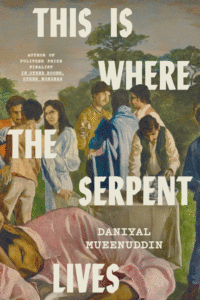
Thoreau Was Actually Funny as Hell
The Walden Author Isn't a Misanthrope—Just Misunderstood
When I was 14 my mother, exasperated by the onset of my teenage angst, handed me a Penguin paperback of Thoreau’s Walden and said, “Read this. The guy who wrote it was a rebel like you.” For some reason, I did as she suggested, and in Walden’s transcendental rants I found all my angsty teenage convictions gloriously and authoritatively ratified. Institutions were bad: they wanted to straitjacket my thoughts and crush my creativity; my elders were either corrupt or absent-mindedly hypocritical, either tyrannical or brainwashed, tragic or just pitiful; the dictates of fashion and good form were stifling and almost always ridiculous; money was a golden calf, prosperity overrated, and “making a good living” was a fool’s errand; as for our so-called government, it was just one big immoral business.
It was all there in Thoreau. On institutions: “Wherever a man goes, men will pursue and paw him with their dirty institutions, and, if they can, constrain him to belong to their desperate odd-fellow society.”
And concerning one’s elders: “One generation abandons the enterprises of another like stranded vessels.”
And about the absurdity of fashions: “We know but few men, a great many coats and breeches . . . The head monkey at Paris puts on a traveller’s cap, and all the monkeys in America do the same.”
And regarding materialism: “A man is rich in proportion to the number of things which he can afford to let alone.” “Give me the poverty that enjoys true wealth.”
And about the corruption of government: “The only true America is that country where…the state does not endeavor to compel you to sustain . . . slavery and war and other superfluous expenses.”
And all this in a book that was 140 years old! Could my mother have known, as she plunked down $8.95 for that crisp paperback with its innocuous cover (Lady Liberty in an 18th-century allegorical painting), that she was financing the most significant turn in her son’s life? The pliable goop of my pre-frontal cortex could not have met with any text more salutary to that hour in my development and its obsessions.
But it wasn’t just Walden’s relentless exposure of every innately North American hypocrisy that caused me—like so many young people before and after me—to adopt it as a gospel; it was also the things the book extolled: the ideal of liberty, the beauty of being out of step, the value of standing aside and taking one’s time, our all-encompassing quotidian natural wonders. Walden was as much a spiritualized embrace of a few choice things as a sneering rejection of others. Even here, though, my adoption of the book was more blindly evangelical than truly comprehending. I needed so badly to attach myself to an idealized Thoreau and ventriloquize through that fearlessly eloquent, time-tested voice—and so keenly did I embody Erikson’s fifth developmental stage (identity vs. identity confusion)—that I was neurologically incapable of any lucid appreciation of just what Thoreau the writer was up to.
Young people, despite their flippant veneers, tend to be terribly earnest—and to flatten into earnestness material that is much more richly nuanced. Subtleties and subtexts aren’t their thing. And it’s mostly young people, we should now admit, who have inadvertently done Thoreau a disservice.
Since around the centennial of his death in the early 1960s, when the advent of the Beats and Civil Rights and Environmentalism engendered a new attachment to Walden’s bygone prophet, we’ve made such good use of old Henry as mouthpiece for one worthy cause or another that we’ve lost all perspective on his marvelous authorial range. In particular, we’ve totally failed to get his jokes.
For me, Thoreau’s writing was a drug. It knocked my neurons around. It worked me over completely, induced a sort of insanity, and actually changed the course of my life forever. And still, until quite recently, I did not get the jokes. Had you taken the pains to point out to me, at fourteen, the extent of the levity that permeates Walden and much of Thoreau’s writing, I might have punched you in the nose. You see, my upbringing was not only religious, but of the proselytizing kind, and that fervor was still in my bones. None of us at church, incidentally, got the jokes in Jesus either. Beam in the eye? Camel through a needle? Sheeps and goats? You could cue us with a high-hat and snare—ba-dum-chah!—but beyond the ensuing song of crickets all you’d get back was grim reverence. Our common assumption was that if one was talking of serious things (in Jesus’ case, salvation of the soul; in Thoreau’s, a secular version of the same), one could only do so, well, seriously.
But though at 14 I wished to believe otherwise, Thoreau never intended for Walden to serve as a self-help manual for virtuous living. His intention was to arrive at certain inalienable truths, but his means of getting there was often oblique rather than direct, and always more artful than strictly autobiographical. He was no social architect, had no such pretensions, and thus was not in the business of issuing blueprints. Throughout his body of writing he relied on exaggeration, sarcasm, paradox, and aphoristic hyperbole over straightforward statement. He frequently opted for the literary and allusive over the literal. And he larded his lines with puns and submerged secondary meanings that frequently aimed for laughs. Depicting himself ironically well-employed as nature’s surveyor and inspector in Walden’s first chapter, he boasts: “I have watered the red huckleberry, the sand cherry and the nettle tree, the red pine and the black ash, the white grape and the yellow violet, which might have withered else in dry seasons.” Like much of Walden’s wit, the Falstaffian irreverence here, wherein Thoreau confesses to being a serial outdoor pisser, went—to deploy a pun of my own—whizzing right over the teenage reader’s head.
Strangely enough, during Henry’s lifetime his problem was precisely the opposite: his audience had learned to anticipate laughs whenever he appeared in print or rose to speak. Thoreau was reputed to be a humorist (it was by that term that Nathaniel Hawthorne described him in a letter to a friend), and on the lyceum circuit he tended to crack up the crowds. Following lectures in Salem and Gloucester in 1848, the reviews were unanimous. His Salem talk, as reported in the local Observer, was “done in an admirable manner, in a strain of exquisite humor, with a strong undercurrent of delicate satire against the follies of the times. Then there were the interspersed observations, speculations, and suggestions upon dress, fashions, food, dwellings, furniture, &c., &c., sufficiently queer to keep the audience in almost constant mirth…The performance has created ‘quite a sensation’ amongst lyceum goers.” Gloucester’s Telegraph also lauded his humor, noting his facility for: “‘bringing down the house’ by his quaint remarks.” In both places, he had lectured from what would become Walden’s overture, “Economy,” which today is popularly (and unjustly) considered a dry and over-long barrier to entry for new readers of the book.
Following his public successes, Thoreau was importuned for more of the same. “Curators of lyceums write to me,” he noted in his journal. “Dear Sir,—I hear that you have a lecture of some humor. Will you do us the favor to read it before the Bungtown Institute?”
He was a comic savant for hire, or so they hoped. At the lectern or not, he tended to give the impression that he was kidding around. After Walden’s 1854 publication, Thoreau bemusedly recorded in the journal that a friend of Emerson had been “much interested in my Walden, but relished it merely as a capital satire and joke, and even thought that the survey and map of the pond were not real, but a caricature of the Coast surveys.”
In the journal in 1855, Henry homed in on his own penchant for planting tongue in cheek:
My faults are:—
Paradoxes,—saying just the opposite,—a style which might be imitated.
Ingenious.
Playing with words,—getting the laugh,—not always simple, strong, and broad.
Using current phrases and maxims, when I should speak for myself.
Not always earnest.
How can we square these facts with Thoreau’s more current reputation? For alongside the idolators and pedestal-makers, Henry has his haters, and one of their favorite complaints is that he was all scowling prophecy, zero funnybone. These dour literalists would show us in Walden and Thoreau’s other works a pouting town pariah, a preachy puritan whose proto-tiny-house experiment in living was no more than a white man’s delusional holiday, a mean little humorless bastard of a scourge on par with Dickens’ Scrooge, and/or a wannabe woodsman disingenuously fortified, in his rustic cabin, by pies from Mom’s kitchen.
This species of attack can be traced backed to 1865, just three years after Thoreau’s death, in a scathing article by James Russell Lowell, one of Thoreau’s erstwhile magazine editors. Writing in the North American Review, Lowell grumbled:
He seems to me to have been a man with so high a conceit of himself that he accepted without questioning, and insisted on our accepting, his defects and weaknesses of character as virtues and powers peculiar to himself. . . . Thoreau seems to have prized a lofty way of thinking (often we should be inclined to call it a remote one) not so much because it was good in itself as because he wished few to share it with him. . . . He seeks, at all risks, for perversity of thought. . . . Mr. Thoreau seems to me to insist in public on going back to flint and steel, when there is a match-box in his pocket which he knows very well how to use at a pinch. . . . Mr. Thoreau had not a healthy mind, or he would not have been so fond of prescribing. His whole life was a search for the doctor. … Thoreau had no humor, and this implies that he was a sorry logician. . . . There is something delightfully absurd in six volumes addressed to a world of such ‘vulgar fellows’ as Thoreau affirmed his fellow men to be. I once had a glimpse of a genuine solitary who spent his winters one hundred and fifty miles beyond all human communication, and there dwelt with his rifle as his only confidant. Compared with this, the shanty on Walden Pond has something the air, it must be confessed, of the Hermitage of La Chevrette.
But roughly halfway through his screed, Lowell discredits himself with a more sweeping complaint, and we catch the dull shimmer of the axe he really wishes to grind:
I look upon a great deal of the modern sentimentalism about Nature as a mark of disease. It is one more symptom of the general liver-complaint. To a man of wholesome constitution the wilderness is well enough for a mood or a vacation, but not for a habit of life. . . . It is a very shallow view that affirms trees and rocks to be healthy, and cannot see that men in communities are just as true to the laws of their organization and destiny. . . . To hear the to-do that is often made over the simple fact that a man sees the image of himself in the outward world, one is reminded of a savage when he for the first time catches a glimpse of himself in a looking-glass.
Here we might have excused the counsel from trying this particular literary case. But Lowell’s words saw print, and lo, point by point (e.g. “[Thoreau] squatted on another man’s land; he borrow[ed] an axe”) his deprecation has spawned innumerable little Lowells ever since—a recent so-called “takedown” of Thoreau in the New Yorker is only the youngest of the clutch, and bears all the predictable birthmarks.
Still, while such philippics crop up with boring semi-annual regularity, Thoreau’s standing in our literature is unshaken. And as we continue to read him, he will continue to be many things to many people—wonderfully so. Speaking to change-makers and ecologists, rainbow-tog Buddhists and curriculum committees, his work is vast in its importance and appeal. And yet, having planted our peace flags, hiking boots, and sundry other emblems and totems in the fecund soil of his pond-side ode to nonconformity, let’s take care not to reduce the richness of Thoreau’s literary genius and flatten out our sense of his roundness as a writer.
Let us remember, especially, how funny he could be—how alive to the special force of wisecracking wit. Here he is, for instance, in the chapter of Walden called “Reading”:
I confess I do not make any very broad distinction between the illiterateness of my townsmen who cannot read at all, and the illiterateness of him who has learned to read only what is for children and feeble intellects. We should be as good as the worthies of antiquity, but partly by first knowing how good they were. We are a race of tit-men, and soar but little higher in our intellectual flights than the columns of the daily paper.
And in the chapter called “Solitude”:
Society is commonly too cheap. We meet at very short intervals, not having had time to acquire any new value for each other. We meet at meals three times a day, and give each other a new taste of that old musty cheese that we are.
And in “Visitors”:
I had more visitors while I lived in the woods than at any other period of my life; I mean that I had some.
And in “Economy”:
Probably I should not consciously and deliberately forsake my particular calling to do the good which society demands of me, to save the universe from annihilation; and I believe that a like but infinitely greater steadfastness elsewhere is all that now preserves it.
And in his journal:
The merchants and banks are suspending and failing all the country over, but not the sand banks, solid and warm . . . You may run on them as much as you please,—even as the crickets do, and find their account in it. . . . In these banks, too, and such as these, are my funds deposited, funds of health and enjoyment. (October 14, 1857)
There is some advantage in being the humblest, cheapest, least dignified man in the village, so that the very stable boys shall damn you. Methinks I enjoy that advantage to an unusual extent. (July 6, 1851)
He is often at his most sparkling when describing animals, as in this 1857 journal entry:
I hear the alarum of a small red squirrel. I see him running by fits and starts along a chestnut bough toward me. His head looks disproportionately large for his body, like a bulldog’s, perhaps because he has his chaps full of nuts. . . . He finds noise and activity for both of us. It is evident that all this ado does not proceed from fear. There is at the bottom, no doubt, an excess of inquisitiveness and caution, but the greater part is make-believe, and a love of the marvelous. He can hardly keep it up till I am gone, however, but takes out his nut and tastes it in the midst of his agitation. “See there, see there,” says he, “who’s that? O dear, what shall I do?” and makes believe run off, but does n’t get along an inch,—lets it all pass off by flashes through his tail, while he clings to the bark as if he were holding in a race-horse. He gets down the trunk at last upon a projecting knot, head downward, within a rod of you, and chirrups and chatters louder than ever. Tries to work himself into a fright. The hind part of his body is urging the forward part along, snapping the tail over it like a whip-lash, but the fore part, for the most part, clings fast to the bark with desperate energy. (October 5, 1857)
What misanthrope writes like that?
Let’s bear in mind that Transcendentalism, beyond being a 19th-century pseudo-religion concerned with abolitionism and utopian farming communities (and long, long before it meant self-congratulatory hallucinogenic trips), was a literary-aesthetic movement. Its writers were practitioners of craft above all else. They knew what they were about on every page. Thoreau “shaped Walden specifically with his contemporary readers in mind,” writes David S. Reynolds in Beneath the American Renaissance: The Subversive Imagination in the Age of Emerson and Melville. “His adaptation of popular humor was an intrinsic element of his self-appointed mission to absorb the language of common Americans and make it the vehicle of uplifting notions about individualism and deliberate living. More frequently than any American writer of the period—more frequently, even, than Emerson—Thoreau underscored the necessity for persons of genius to incorporate into their style the popular idioms of their own time and culture. . . . The humor of Walden is indeed popular humor, but it is popular humor carefully transformed by a philosopher who wishes to salvage both his culture and his culture’s favorite images.”
Does it seem superficial to plead for appreciation of Thoreau’s stylistic range, and to do so now, in our apocalyptic days of social and climatological unrest, when it is his messages—“In wildness is the preservation of the world,” etc.—that remain so urgent and resonant? The thing is, despite our contemporary enshrinement of “Content” as the keyword of progress, popularity, and profit, what makes a work of literature lasting is its form as much as what it contains. The order, shape, and semi-secret palimpsest of meanings matters. The design matters. That is to say, the art and discipline of literature matters.
In our understanding of old Henry, prophetic exponent of simplicity, what seems called for is an injection of salubrious complexity. This was no wannabe woodsman nor failed hermit nor mama’s boy. This was a writer. Generation after generation since Lowell, Thoreau’s haters have insisted on “exposing” him as fake, “unlikeable,” or humorless because they fail to grasp the distinction between literary license and the literal, or to appreciate his complex identity as an artist—that is, as a creator of literary conceits.
Is it because he sneered at so many of our still precious constructs that they love to sneer back at the construct of his masterful book? For artistic construct—deep, painstakingly developed, and nearly ten years in the writing—is what Walden has been all along. Ralph Waldo Emerson spoke to this aspect of Thoreau’s vision in the eulogy for his friend: “There was an excellent wisdom in him, proper to a rare class of men, which showed him the material world as a means and symbol. . . . The tendency to magnify the moment, to read all the laws of nature in the one object or one combination under your eye . . . The pond was a small ocean; the Atlantic, a large Walden Pond. He referred every minute fact to cosmical laws.”
From Walden’s opening pages Thoreau himself pitches the book’s whole premise at the level of parable:
I long ago lost a hound, a bay horse, and a turtle-dove, and am still on their trail. Many are the travellers I have spoken concerning them, describing their tracks and what calls they answered to. I have met one or two who had heard the hound, and the tramp of the horse, and even seen the dove disappear behind a cloud, and they seemed anxious to recover them as if they had lost them themselves.
And in the following, which comes roughly at Walden’s midpoint, he lays bare the entire conceit. Just look at how he draws the world’s immensity into the luminous exurban environs of the book as into a visionary crystal ball:
There is commonly sufficient space about us. Our horizon is never quite at our elbows. . . . For what reason have I this vast range and circuit, some square miles of unfrequented forest, for my privacy, abandoned to me by men? My nearest neighbor is a mile distant, and no house is visible from any place but the hill-tops within half a mile of my own. I have my horizon bounded by woods all to myself; a distant view of the railroad where it touches the pond on the one hand, and of the fence which skirts the woodland road on the other. But for the most part it is as solitary where I live as on the prairies. It is as much Asia or Africa as New England. I have, as it were, my own sun and moon and stars, and a little world all to myself. At night there was never a traveller passed my house, or knocked at my door, more than if I were the first or last man.
And at Walden’s close, quite deliberately, Thoreau disowns the role of exemplar, thus discouraging the reader from taking his account too much at face value, as some kind of sociological reform paper:
I left the woods for as good a reason as I went there. Perhaps it seemed to me that I had several more lives to live, and could not spare any more time for that one. It is remarkable how easily and insensibly we fall into a particular route, and make a beaten track for ourselves. I had not lived there a week before my feet wore a path from my door to the pond-side; and though it is five or six years since I trod it, it is still quite distinct. It is true, I fear that others may have fallen into it, and so helped to keep it open.
“Walden aims at conversion,” noted John Updike. But this is true only insofar as we mean conversion of the mystic and personal order: introspective realization, not outward revolution. Inward moral clarity at the level of the individual situated within the natural world, not a holy-minded movement en masse. Thoreau never saw a crowd he could trust or would care to join. He’d said it in the first chapter, too:
I would not have anyone adopt my mode of living on any account; for, besides that before he has fairly learned it I may have found out another for myself, I desire that there be as many different persons in the world as possible; but I would have each one be careful to find out and pursue his own way, and not his father’s or his mother’s or his neighbor’s instead.
There it is, kids. And lest any of you aged 14 or younger are now rowing out upon the rippling and prismatic infinities of Thoreau’s work, I wish you the best on what may become a lifelong exploration. Like Walden Pond itself, rumored in his time to have no bottom, old Henry won’t be plumbed. But I beg you, please, please give the guy some credit by laughing as you sink your line.
From the Introduction to Funny-Ass Thoreau. Used with permission of Atelier26 Books. Copyright 2016 by M. Allen Cunningham.
M. Allen Cunningham
M. Allen Cunningham is the author of six books, including the #1 Indie Next novel The Green Age of Asher Witherow (Unbridled Books, 2004); a biographical novel about Rainer Maria Rilke entitled Lost Son (Unbridled Books, 2007); and Partisans (Atelier26, 2015), a samizdat novel about unbridled surveillance, constant war, and maddening technological upheaval, which was a finalist for the Flann O'Brien Award for Innovative Fiction. His work has appeared in many literary outlets including The Kenyon Review, Glimmer Train, Tin House, and Alaska Quarterly Review.



















